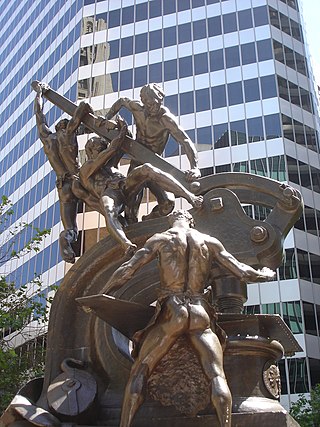Related Research Articles

A social class or social stratum is a grouping of people into a set of hierarchical social categories, the most common being the upper, middle and lower classes. Membership in a social class can for example be dependent on education, wealth, occupation, income, and belonging to a particular subculture or social network.

Social class in the United States refers to the idea of grouping Americans by some measure of social status, typically by economic status. However, it could also refer to social status and/or location. The idea that American society can be divided into social classes is disputed, and there are many competing class systems.
The term social order can be used in two senses: In the first sense, it refers to a particular system of social structures and institutions. Examples are the ancient, the feudal, and the capitalist social order. In the second sense, social order is contrasted to social chaos or disorder and refers to a stable state of society in which the existing social structure is accepted and maintained by its members. The problem of order or Hobbesian problem, which is central to much of sociology, political science and political philosophy, is the question of how and why it is that social orders exist at all.

George William "Bill" Domhoff is a Distinguished Professor Emeritus and research professor of psychology and sociology at the University of California, Santa Cruz, and a founding faculty member of UCSC's Cowell College. He is best known as the author of several best-selling sociology books, including Who Rules America? and its seven subsequent editions.

Social stratification refers to a society's categorization of its people into groups based on socioeconomic factors like wealth, income, race, education, ethnicity, gender, occupation, social status, or derived power. As such, stratification is the relative social position of persons within a social group, category, geographic region, or social unit.

In political and sociological theory, the elite are a small group of powerful people who hold a disproportionate amount of wealth, privilege, political power, or skill in a group. Defined by the Cambridge Dictionary, the "elite" are "those people or organizations that are considered the best or most powerful compared to others of a similar type."

Mathematical sociology or the sociology of mathematics is an interdisciplinary field of research concerned both with the use of mathematics within sociological research as well as research into the relationships that exist between maths and society.

André Beteille, is an Indian sociologist, writer and academician. He is known for his studies of the caste system in South India. He has served with educational institutions in India such as Delhi School of Economics, North Eastern Hill University, and Ashoka University.
Life chances is a theory in sociology which refers to the opportunities each individual has to improve their quality of life. The concept was introduced by German sociologist Max Weber in the 1920s. It is a probabilistic concept, describing how likely it is, given certain factors, that an individual's life will turn out a certain way. According to this theory, life chances are positively correlated with one's socioeconomic status.
The American upper class is a social group within the United States consisting of people who have the highest social rank, primarily due to economic wealth. The American upper class is distinguished from the rest of the population due to the fact that its primary source of income consists of assets, investments, and capital gains rather than wages and salaries. The American upper class is estimated to include 1–2% of the population.
Dennis L. Gilbert is a professor emeritus and former chair of sociology at Hamilton College in Clinton, New York. He holds a Doctor of Philosophy degree from Cornell University and has taught at the Universidad Católica in Lima, Peru, Cornell University, and joined Hamilton college in 1976. He has published a variety of sociology books, mainly dealing with socio-economic stratification.

Joe Richard Feagin is an American sociologist and social theorist who has conducted extensive research on racial and gender issues in the United States. He is currently the Ella C. McFadden Distinguished Professor at Texas A&M University. Feagin has previously taught at the University of Massachusetts, Boston, University of California, Riverside, University of Texas at Austin, and the University of Florida.
Victor G. Nee is an American sociologist and professor at Cornell University, known for his work in economic sociology, inequality and immigration. He published a book with Richard Alba entitled Remaking the American Mainstream proposing a neo-assimilation theory to explain the assimilation of post-1965 immigrant minorities and the second generation. In 2012, he published Capitalism from Below co-authored with Sonja Opper examining the rise of economic institutions of capitalism in China. Nee is the Frank and Rosa Rhodes Professor, and Director of the Center for the Study of Economy and Society at Cornell University. Nee received the John Simon Guggenheim Fellowship in 2007, and has been a visiting fellow at the Russell Sage Foundation in New York ( 1994–1995), and the Center for Advanced Study in the Behavioral Sciences (1996-1997). He was awarded an honorary doctorate in Economics by Lund University in Sweden in 2013.

Historical sociology is an interdisciplinary field of research that combines sociological and historical methods to understand the past, how societies have developed over time, and the impact this has on the present. It emphasises a mutual line of inquiry of the past and present to understand how discrete historical events fit into wider societal progress and ongoing dilemmas through complementary comparative analysis.
The following events related to sociology occurred in the 1970s.

Sociology is a social science that focuses on society, human social behavior, patterns of social relationships, social interaction, and aspects of culture associated with everyday life. In simple words sociology is the scientific study of society. It uses various methods of empirical investigation and critical analysis to develop a body of knowledge about social order and social change. While some sociologists conduct research that may be applied directly to social policy and welfare, others focus primarily on refining the theoretical understanding of social processes and phenomenological method. Subject matter can range from micro-level analyses of society to macro-level analyses.
Jonathan R. Cole, is an American sociologist, John Mitchell Mason Professor of the University at Columbia University. He is best known for his scholarly work developing the sociology of science and his work on science policy. From 1989 to 2003 he was Columbia’s chief academic officer – its Provost and Dean of Faculties.

John Peter Scott is an English sociologist working on issues of economic and political sociology, social stratification, the history of sociology, and social network analysis. He is currently working independently, and has previously worked at the Universities of Strathclyde, Leicester, Essex, and Plymouth. He is a Fellow of the British Academy, a Fellow of the Royal Society of Arts, and a Fellow of the Academy of Social Sciences. He has been a member of the British Sociological Association since 1970. In 2015 he became Chair of Section S4 of the British Academy. In 2016 he was awarded an Honorary Doctorate of Essex University.
Arne Lindeman Kalleberg is a Kenan Distinguished Professor of Sociology at the University of North Carolina at Chapel Hill and a Faculty Fellow at the Carolina Population Center. He is also an adjunct professor in the Kenan-Flagler Business School, the Department of Public Policy, and the Curriculum in Global Studies. Kalleberg served as the secretary of the American Sociological Association from 2001 to 2004 and as its president from 2007 to 2008. He has been the editor-in-chief of Social Forces, an international journal of social research for over ten years.

Michael Hechter is an American sociologist and Foundation Professor of Political Science at Arizona State University. He is also Emeritus Professor of Sociology at the University of Washington.
References
- ↑ "Leonard Beeghley at the University of Florida's web-site" (PDF). Archived from the original (PDF) on 2007-09-28. Retrieved 2007-06-14.
- ↑ "Amazon.com, list of publications". Amazon. Retrieved 2007-06-14.